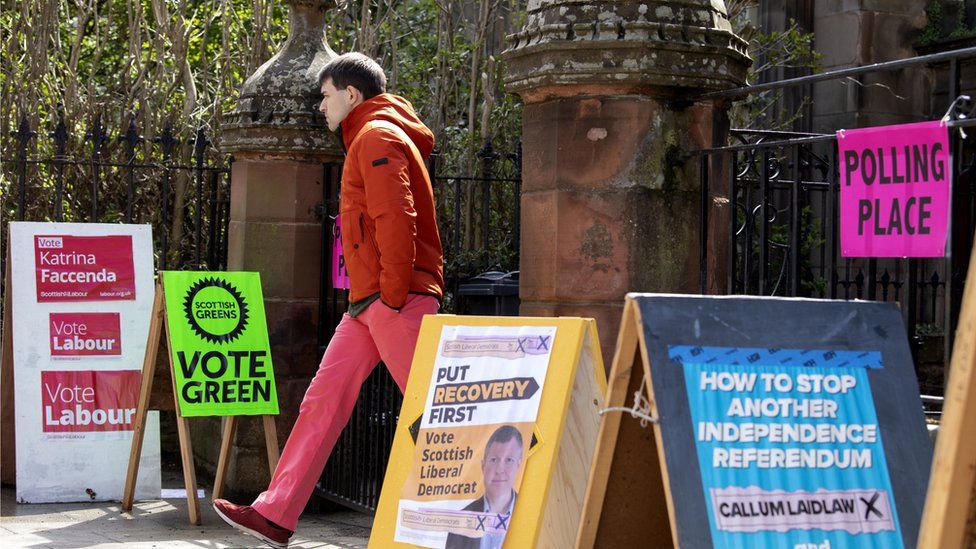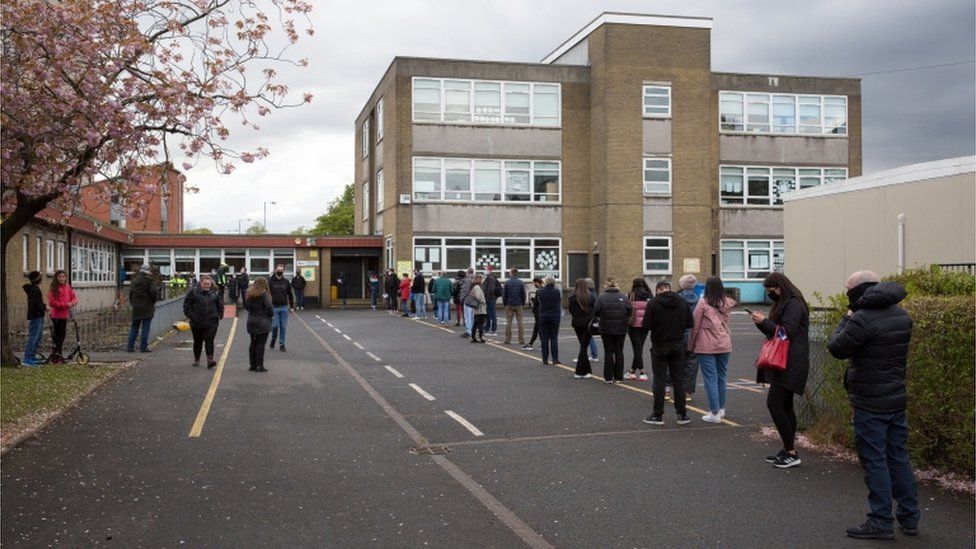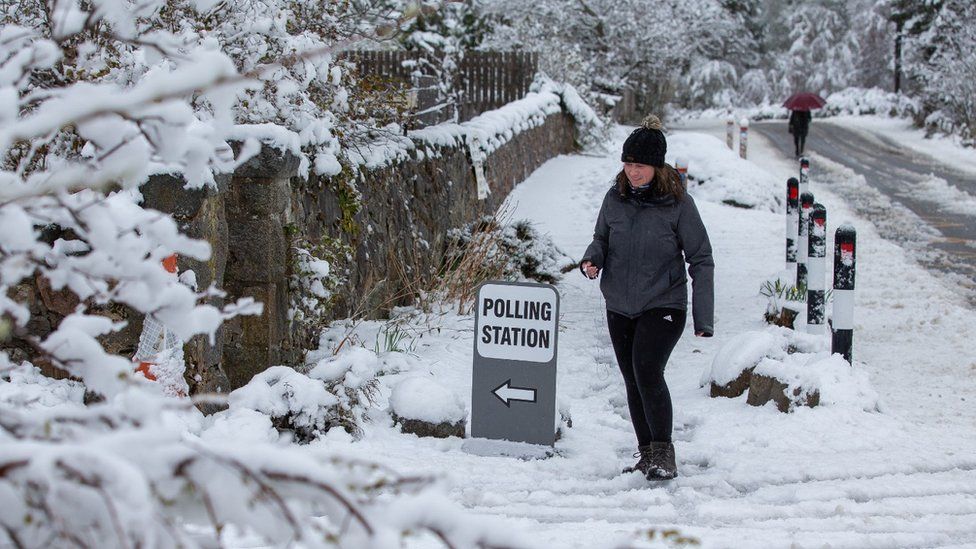
Voting in the Scottish Parliament election has ended but Scotland has an 11-hour wait for counting of the ballots to begin.
The usual overnight count was postponed because of Covid restrictions.
Instead, counting will start at 09:00 on Friday, with the final result expected on Saturday.
A record number of people had already cast their ballots before polls opened - with more than a million having registered to vote by post.
The election is seen as being crucial to the future of the UK as the result could impact on whether or not there is a second referendum on Scottish independence.
But it will also decide who forms the next Scottish government, which has considerable powers over areas such as health, education and income tax.
The Electoral Management Board expects 48 of the 73 constituencies to be declared on Friday, including both the most marginal and safest seats from 2016, and eight of the SNP's top 10 target seats.
These include the Labour defences of Dumbarton, Edinburgh Southern and East Lothian, none of which have a majority exceeding 3%, and the Conservative seats in Ayr, Edinburgh Central, Dumfriesshire and Eastwood.
BBC Scotland editor Sarah Smith said: "Opinion polls seem to show Nicola Sturgeon will have another term as First Minister, the question is more what size of majority she will have."

SCOTLAND'S ELECTION: THE BASICS
What's happening? On 6 May, people across Scotland voted to elect 129 Members of the Scottish Parliament (MSPs). The party that wins the most seats will form the government. Find out more here.
What powers do they have? MSPs pass laws on aspects of life in Scotland such as health, education and transport - and have some powers over tax and welfare benefits.

Scotland's party leaders all turned out at polling stations on Thursday.
Scottish Labour's Anas Sarwar and Scottish Green co-leader Patrick Harvie cast their votes in Glasgow.
Scottish Conservative leader Douglas Ross was at Alves Hall in Moray, while Scottish Liberal Democrat leader Willie Rennie - who had also voted by post - was at Strathpeffer Community Centre near Dingwall.
SNP leader Nicola Sturgeon, who had already voted by post, visited polling stations in the south side of Glasgow and was involved in a tense confrontation with a far-right candidate.
The SNP leader was praised on social media for how she handled an approach from former deputy leader of Britain First Jayda Fransen, who accused Ms Sturgeon of "flooding" the country with immigrants.
Footage posted online showed her calling Ms Fransen "a fascist and a racist".

Voting in this election was impacted by the pandemic, with voters expected to follow social distancing rules, wear face coverings and use hand sanitiser at the polling stations. Special measures were put in place to allow people who tested positive for Covid-19 or were self-isolating to apply for a proxy vote on the day.
At some polling stations people were still queuing to vote at 22:00. People already waiting in line were allowed to vote after the official closing time.
Two voters in Glasgow North West said they were temporarily turned away from a polling station because ballot boxes were "too full".
Nadeem and Joanna Basharat went to vote at Jordanhill Parish Church polling station at 20:30, but were told to come back later because ballot box 52 was too full.
When they went back to vote, they said the box still looked very full and the papers inside had just been "pushed down".
A spokesman for Glasgow's Returning Officer said: "The sheer size of the regional paper meant some ballot boxes became full. We were able to deliver replacement boxes, but in this case some voters were asked to wait outside before voting.
"The presiding officer is confident that all voters who were asked to wait were ultimately able to vote."

There have been no exit polls, and none of the parties have made predictions about the result of the election.
BBC political editor Laura Kuenssberg tweeted that the SNP were "confident they'll get overall majority for Indy ref but not sure they'll hit magic 65".
Nick Eardley, a BBC political correspondent, said the Tories thought their campaign focus on the regional list was "bearing fruit".
With big health warning again, SNP think their vote more like 2019 (good) than 2017 (not as good). But electoral system is complicated.
Tories confident their regional list focus is bearing fruit.
Chat of tactical unionist voting in constituencies, but we’ll see in 48 hours. https://t.co/n1CB9QooWF
— Nick Eardley (@nickeardleybbc) May 6, 2021
Several party leaders did take to social media after the polls closed to thank their supporters for their help during the election campaign.
Ms Sturgeon said the SNP campaign teams had been "awesome" and added: "Seeing long queues of people at polling stations was a very special sight - regardless of voting intention."
Mr Sarwar said on Twitter he was "so proud" of Scottish Labour's "positive and forward looking campaign".
Scottish Liberal Democrat leader Mr Rennie thanked his party's members for their energetic and positive campaign. He said they were waiting "on tenterhooks for results to come in", but noted "how special it is to live in a country where parties can compete freely and fairly for the public's vote".
Mr Harvie said the Scottish Greens supporters had been part of their "best campaign ever".
Anyone living in Scotland and registered to vote was eligible, so long as they were aged 16 or over on the day of the election and had not been legally excluded from voting (for example because they were serving a prison sentence of longer than 12 months).
People had two votes - one for a constituency MSP and another for a regional ballot.
There are 73 Constituency MSPs, each elected on a first-past-the-post system similar to the UK general election - the winner is the candidate who receives the most votes in each constituency.
In the regional ballot, people vote for a party. The parties are then allocated a number of MSPs depending on how many votes they receive - once the number of constituencies already won in that region is taken into account - to make the overall result more proportional.
There are eight electoral regions, each with seven regional MSPs. This means that people in Scotland are each represented by eight MSPs - one representing their constituency and the other seven representing their region.
The Scottish government is formed from the party that hold the most seats in the parliament, or alternatively a coalition of more than one party.
Other elections also took place across the UK on Thursday, including for the Welsh Parliament.
There were also elections for seats on 143 English councils and for 13 local mayors, as well as a by-election for the Westminster seat of Hartlepool in the north east of England.
About 48 million people across the UK were eligible to take part in the elections - many of them postponed from last year because of the pandemic.

SIGN UP FOR SCOTLAND ALERTS: Get extra updates on BBC election coverage


https://news.google.com/__i/rss/rd/articles/CBMiQWh0dHBzOi8vd3d3LmJiYy5jby51ay9uZXdzL3VrLXNjb3RsYW5kLXNjb3RsYW5kLXBvbGl0aWNzLTU3MDE0ODg10gFFaHR0cHM6Ly93d3cuYmJjLmNvLnVrL25ld3MvdWstc2NvdGxhbmQtc2NvdGxhbmQtcG9saXRpY3MtNTcwMTQ4ODUuYW1w?oc=5
2021-05-06 22:17:33Z
52781565070008
Tidak ada komentar:
Posting Komentar